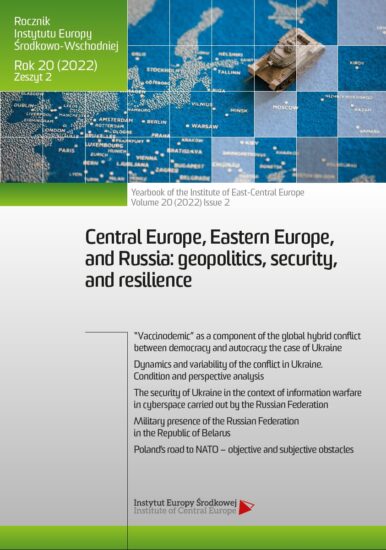Polska w obliczu kryzysu migracyjnego 2015 roku
ORCID: Alicja Zyguła: 0000-0002-9919-847X
Afiliacja: The John Paul II Catholic University of Lublin, Poland
Pages: 155-166
Edition: Lublin 2022
DOI: https://doi.org/10.36874/RIESW.2022.2.9
Citation method: A. Zyguła, Poland in the face of the 2015 migration crisis, „Rocznik Instytutu Europy Środkowo-Wschodniej” 20(2022), z. 2, s. 155-166, DOI: https://doi.org/10.36874/RIESW.2022.2.9.
Keywords: migration, refugee crisis, security
Abstract: The issue of mass migration to the European Union, although it has been present in the public space for several years, is still topical. Following the population movements in Europe and the massive influx of migrants from the Middle East to the borders of the European Union, the accumulation of which occurred in 2015, a number of phenomena related to the so-called migration crisis have been subject to research analysis. The aim of the considerations undertaken in this case study is to present the way in which Poland’s position towards the EU’s proposals for solving the migration crisis has evolved. A content analysis of the literature on the subject and the legal acts provided an answer to the question of how Poland’s attitude changed after the 2015 parliamentary elections. And what factors underpinned the change of approach regarding the reception of refugees. This study uses mainly theoretical research methods such as analysis, which includes content analysis of the literature and available documents, and statistical studies on the research phenomenon. The analysis of the problem leads to the reflection that the proposal for a solution to the EU migration crisis has divided both the European Community and many other countries. In the face of a crisis, solidarity with the community and responsibility for the security of citizens were at stake. In 2015, this issue aroused a lot of emotion during the ongoing political campaign in Poland and was part of the electoral game. The victorious party and the new government have unequivocally rejected the idea of relocation, confirming that security is their overriding priority.
Bibliography:
Albareda A., Prioritizing professionals? How the democratic and professionalized nature of interest groups shapes their degree of access to EU officials, “European Political Science Review” 2020, vol.12, pp. 485-501.
Beyers J., Policy Issues, Organisational Format and the Political Strategies of Interest Organisations, “West European Politics” 2008, vol. 31, pp. 1188-1211.
Beyers J., Braun C., Ties that Count. Explaining Interest Group Access to Policymakers, “Journal of Public Policy” 2014, vol. 34, pp. 93-121.
Beyers J., De Bruycker I., Lobbying Makes (Strange) Bedfellows: Explaining the Formation and Composition of Lobbying Coalitions in EU Legislative Politics, “Political Studies” 2018, vol. 66, no. 4, pp. 959-984.
Binderkrantz A.S., Beyers J., Pedersen H.H., What is access? a discussion of the definition and measurement of interest group access, “European Political Science” 2017, vol. 16, pp. 306-321.
Cronk L., Leech B., Meeting at Grand Central: Understanding the social and evolutionary roots of cooperation, Princeton 2012.
De Bruycker I., Beyers J., Balanced or Biased? Interest Groups and Legislative Lobbying in the European News Media, “Political Communication” 2015, vol. 32, no. 3, pp. 453-474.
Dür A., Mateo G., The Europeanization of interest groups: Group type, resources and policy area, “European Union Politics” 2014, vol. 15, no. 4, pp. 572-594.
Eising R., Institutional Context, Organizational Resources and Strategic Choices Explaining Interest Group Access in the European Union, “European Union Politics” 2007, vol. 8, no. 3, pp. 329-362.
Heaney M.T., Outside the Issue Niche: The Multidimensionality of Interest Group Identity, “American Politics Research” 2004, vol. 32, no. 6, pp. 611-651.
Heaney M.T., Lorenz G., Coalition portfolios and interest group influence over the policy process, “Interest Groups & Advocacy” 2013, vol. 2, pp. 251-277.
Hojnacki M., Interest Groups’ Decisions to Join Alliances or Work Alone, “American Journal of Political Science” 1997, vol. 41, no. 1, pp. 61-87.
Hojnacki M., Organized Interests’ Advocacy Behaviour in Alliances, “Political Research Quarterly” 1998, vol. 51, no. 2, pp. 437-459.
Hula K.W., Lobbying Together: Interest Group Coalitions in Legislative Politics, Washington 1999.
Jones B.D., Baumgartner F.R., The Politics of Attention. How the Government Prioritizes Problems, Chicago 2005.
Klüver H., Lobbying in the European Union: Interest Groups, Lobbying Coalitions, and Policy Change, Oxford 2013.
Mahoney C., Baumgartner F.R., The determinants and effects of interest-group coalitions, 2004, https://fbaum.unc.edu/papers/Mahoney_Baumgartner_APSA_2004_Coalitions.pdf.
Mahoney C., Networking vs. Allying: The Decision of Interest Groups to Join Coalitions in the US and the EU, “Journal of European Public Policy” 2007, vol. 14, no. 3, pp. 366-383.
Mahoney C., Baumgartner F.R., Partners in Advocacy: Lobbyists and Government Officials in Washington, “Journal of Politics” 2015, vol. 77, no. 1, pp. 202-215.
Rasmussen M.K., The battle for influence: the politics of business lobbying in the European Parliament, “JCMS: Journal of Common Market Studies” 2015, vol. 53, no. 2, pp. 365-382.
Sabatier P., An Advocacy Coalition Framework of Policy Change and the Role of Policy-Oriented Learning Therein, “Policy Sciences” 1988, vol. 21, no. 2/3, pp. 129-168.
Salisbury R., Heinz J., Laumann E., Nelson R., Who Works with Whom? Interest Group Alliances and Opposition, “American Political Science Review” 1987, vol. 81, pp. 1217-1234.
Sorurbakhsh L., Interest group coalitions and lobbying environments: toward a new theoretical perspective, “Interest Groups & Advocacy” 2016, vol. 5, pp. 200-223.
Stevens F., De Bruycker I., Influence, affluence and media salience: Economic resources and lobbying influence in the European Union, “European Union Politics” 2020, vol. 21, pp. 1-23. Tarrow S., Power in Movement: Social Movements and Contentious Politics, Cambridge 1994.
Wonka A., De Bruycker I., De Bièvre D., Braun C., Beyers J., Patterns of conflict and mobilization: Mapping interest group activity in EU legislative policymaking, “Politics and Governance” 2018, vol. 6, no. 3, pp. 136-146.
Young M., Developing Interests: Organizational Change and the Politics of Advocacy, Lawrence 2010.
Zald M.N., McCarthy J.D., Resource Mobilization and Social Movements: A Partial Theory, [in:] Social Movements in an Organizational Society: Collected Essays, M.N. Zald, J.D. McCarthy, W.A. Gamson (eds.), New York 1987.

PDF: Download